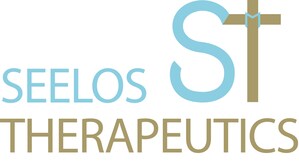Seelos Therapeutics Announces Initiation of Preclinical Study of SLS-007 in Parkinson's Disease
SLS-007 is Seelos' Second Gene Therapy Program Targeting Alpha-Synuclein
Top-line Data Expected Late 2020/Early 2021
NEW YORK, June 25, 2020 /PRNewswire/ -- Seelos Therapeutics, Inc. (Nasdaq: SEEL), a clinical-stage biopharmaceutical company focused on the development of therapies for central nervous system disorders and rare diseases, today announced the initiation of a preclinical study of SLS-007 in Parkinson's disease (PD) delivered through an adeno associated viral (AAV) vector targeting the non-amyloid component core (NACore) of alpha synuclein (α-synuclein).
Seelos has initiated an in vivo preclinical study of SLS-007 in rodents to assess the ability of two specific novel peptides, S62 and S71, delivered via AAV1/2 viral vector, to protect dopaminergic function in the preformed α-synuclein fibril (PFF) rodent model of PD. Production of AAV1/2 vectors encoding each of the two novel peptides incorporating hemagglutinin (HA) tags has already been completed.
This preclinical study is designed to establish the in vivo pharmacokinetic and pharmacodynamic profiles and target engagement parameters of SLS-007. Top-line data is currently expected in late 2020/early 2021.
"In in vitro models, halting or slowing the aggregation of alpha synuclein dramatically slowed the formation of Lewy Bodies which are the hallmarks of the pathogenesis of Parkinson's," said Raj Mehra, Ph.D., Chairman and CEO of Seelos. "This program should complement SLS-004 in which we also recently began studies."
SLS-007 is a family of rationally designed peptidic inhibitors which target the NACore of α-synuclein to inhibit protein aggregation in patients with PD. This central segment of α-synuclein termed NACore, that is comprised of residues 68-78, has a critical role in the aggregation and cytotoxicity of α-synuclein. Overexpression of α-synuclein leads to the formation of α-synuclein aggregates which comprise Lewy bodies and neurites which are the hallmarks of the pathogenesis of PD. Recent in vitro and cell culture research have shown that SLS-007 has the potential to stop the propagation and seeding of α-synuclein aggregates.
About Alpha-synuclein (α-synuclein)
Alpha-synuclein (α-synuclein) is a protein which is of great interest to Parkinson's researchers because it is a major constituent of Lewy bodies and Lewy neurites, protein clumps that are the pathological hallmark of synucleinopathies, such as PD, dementia with Lewy bodies (DLB) and multiple system atrophy (MSA). In the several years since its discovery, α-synuclein has been the focus of intensive efforts by PD researchers working to definitively characterize the protein's role in Parkinson's and its potential as a target for neuroprotective therapies.
In 2017, The Michael J. Fox Foundation convened leaders from academia and industry to form the Alpha-Synuclein Clinical Path Working Group. The group's goal was to lay out a roadmap to advance drugs targeting alpha-synuclein proteins and increase their odds of success.
For more information, please visit: https://www.michaeljfox.org/news/roadmap-alpha-synuclein
Forward Looking Statements
Statements made in this press release, which are not historical in nature, constitute forward-looking statements for purposes of the safe harbor provided by the Private Securities Litigation Reform Act of 1995. These statements include, among others, those regarding the initiation and completion of the preclinical study of SLS-007, expectations regarding the ability of novel peptides S62 and S71, delivered via AAV1/2 viral vector, to protect dopaminergic function in the preformed α-synuclein fibril (PFF) rodent model of PD, expectations regarding the results of the study, including the establishment of the in vivo pharmacokinetic and pharmacodynamics profiles and target engagement parameters of SLS-007, the expected timing for releasing top-line data regarding the study and the ability of SLS-007 to complement SLS-004. These statements are based on Seelos' current expectations and beliefs and are subject to a number of factors and uncertainties that could cause actual results to differ materially from those described in the forward-looking statements. Risks associated to Seelos' business include, but are not limited to, the risk of not successfully executing its preclinical and clinical studies and not gaining marketing approvals for its product candidates, the risks associated with the implementation of a new business strategy, the risks related to raising capital to fund its development plans and ongoing operations, risks related to Seelos' current stock price, risks related to the global impact of COVID-19, as well as other factors expressed in Seelos' periodic filings with the U.S. Securities and Exchange Commission, including its Annual Report on Form 10-K and Quarterly Reports on Form 10-Q. Although we believe that the expectations reflected in our forward-looking statements are reasonable, we do not know whether our expectations will prove correct. You are cautioned not to place undue reliance on these forward-looking statements, which speak only as of the date hereof, even if subsequently made available by us on our website or otherwise. We do not undertake any obligation to update, amend or clarify these forward-looking statements, whether as a result of new information, future events or otherwise, except as may be required under applicable securities laws.
Contact Information:
Anthony Marciano
Head of Corporate Communications
Seelos Therapeutics, Inc. (Nasdaq: SEEL)
300 Park Ave., 12th Fl
New York, NY 10022
(646) 293-2136
[email protected]
https://seelostherapeutics.com/
https://twitter.com/seelostx
https://www.linkedin.com/company/seelos
SOURCE Seelos Therapeutics, Inc.

Related Links
WANT YOUR COMPANY'S NEWS FEATURED ON PRNEWSWIRE.COM?
Newsrooms &
Influencers
Digital Media
Outlets
Journalists
Opted In





Share this article